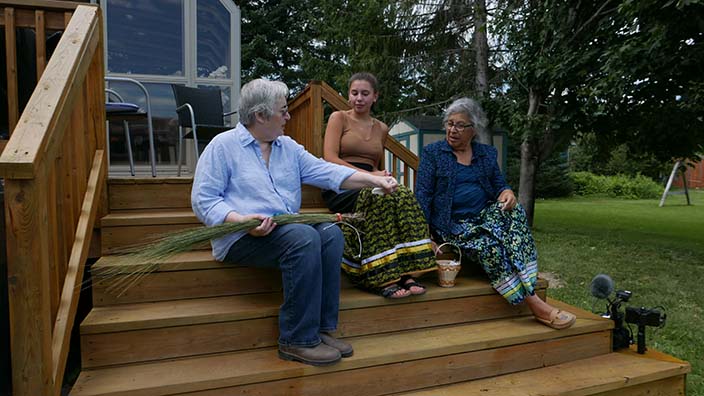With graduation 2021 almost here, we’re highlighting a few of the students finishing their time at King’s. We applaud the hard work and dedication shown by the entire Class of 2021 and we wish them great success and fulfillment!
Emma Metallic, Bachelor of Arts, combined honours in Contemporary Studies and the Law, Justice & Society program, with a minor in Indigenous Studies
Early on, Emma Metallic knew that she wanted to learn to speak Mi’gmaq. Growing up in Listuguj, Québec, Metallic became interested in the role the language played in her community.
“I always had a passion for the language, I was always interested in it and I heard it growing up. My grandma was the one who taught it to me in high school. And from then I just always knew that when I was older I wanted to be able to speak the language fluently and to be able to pass it down.”

From Left: Diane Mitchell, Emma Metallic, and Eunice Metallic.
Since coming to King’s these interests have continued to grow. In the summer after her third year, Metallic worked with the Language Revitalization Project in her hometown. As she prepares to graduate with a Bachelor of Arts holding a combined honours in Contemporary Studies and the Law, Justice & Society program, with a minor in Indigenous Studies, she reflects on how she has integrated these long-held passions with her degree work. Metallic’s honours thesis focused on language loss in Listuguj and the community’s efforts to rejuvenate the Mi’gmaq language.
One of the key questions she considered is how effective it is to promote language fluency in a community if the deeper cultural damage associated with generations of language loss remains unaddressed.
“I think we need to unpack what it means to revitalize our language. Mi’gmaq speakers are passing down the language, yet challenges persist towards revitalizing Mi’gmaw. Mi’gmaq speakers are tasked with revitalizing Mi’gmaw while unspoken colonial traumas of Mi’gmaq language loss linger nearby— hindering relations between Mi’gmaq speakers and learners. I think framing our Mi’gmaq language revitalization efforts beyond fluency can be a way to address colonial traumas that have and still impact our language and homes—helping Mi’gmaq speakers and learners to understand one another and their relations to Mi’gmaw.”

Listuguj, Que.
Language, and the ability to communicate was also what drew Metallic to King’s, though in a different way. She says she wanted to learn how to “get her message across” and she was compelled by the promise that the Foundation Year Program would make her a better writer.
It seems to have worked. Asked what the highlight of her time at King’s has been, Metallic says it was presenting a paper to her peers at the Contemporary Studies Program’s student-led conference in her third year.
“The paper that I wrote was about engaging with Mi’gmaw legal orders through an Indigenous feminist legal theory. For me it was a special moment to talk about my community and talk about Indigenous legal orders without bringing it into this utopic domain—[a context] where I’m also able to critique it, while bringing in Mi’gmaw stories and the language.”
This summer, Metallic will continue working with the Language Revitalization Project in Listuguj. In the fall, she looks forward to enrolling in an Adult Mi’gmaq Immersion program.
“I’ve been wanting to do it for a few years but it just hasn’t been the right time. Now I feel like […] this is the perfect time to do it.”
Cory McConnell, Bachelor of Arts, combined honours in Contemporary Studies and Philosophy
Cory McConnell’s introduction to philosophy came as a teenager from their parish priest in East Preston, Nova Scotia. The priest and his wife were both King’s alumni.
“I started becoming interested in philosophy just through listening to him preach on Sundays and going to Bible study. Over time as I became more interested in philosophy, both he and his wife encouraged me to apply to King’s.”

Cory McConnell
McConnell is now about to graduate with a Bachelor of Arts, having taken a combined honours in Contemporary Studies and Philosophy. And they have been awarded funding to pursue a Masters in Philosophy at Ryerson in the fall.
The study of philosophy has been a transformative force in McConnell’s life.
“I’ve been able to expand my perspective and learn to engage critically with a variety of different sources, specifically through the second-year Contemporary Studies course Modern, Social and Political Thought. The lecture on Carl Schmitt—this committed Nazi—really changed the way that I engaged with texts, trying to […] look for the things that might have made these ideas appealing, in order to better critically engage with them—rather than just marginalizing problematic ideas.”
Alongside this, McConnell undertook a process of self-discovery.
“Personally, I came out as non-binary when I came to King’s—this is the first time I had the supportive community I needed in order to express myself in that way. It’s [been] the dual process of coming to terms with myself as an individual and then also expanding out from that to critically engage with […] intellectual history and bring that into modern social and political issues.”
McConnell’s thesis was written as a critique of Identity Politics rooted in continental philosophy and the history of queer liberation.
“I wrote my thesis on the ‘Q’ in the LGBTQ acronym, and the fact that it signifies both ‘queer’ and ‘questioning.’ The argument is that there’s this kind of linguistic relationship in there—that queerness is both posing gender and sexuality as a question, and it’s kind of both identities at once.”
Asked if there’s something they’ve learned while at King’s that they would like everyone to know, they point to the importance of examining different points of view—if only to test your own beliefs.
“I think the only way that you can truly know where you disagree with something is if you try and defend that position as far as you can until you get to a point where you just cannot do it anymore. And then that’s the point where you know that you really have understood this position and know how to break from it. I think that you should always be ready to find that critical point with everything that you believe.”
Join us on May 27 to honour and congratulate the Class of 2021! The celebration will be shared on Facebook and YouTube May 27 starting at 3 p.m. AT. Learn more.

